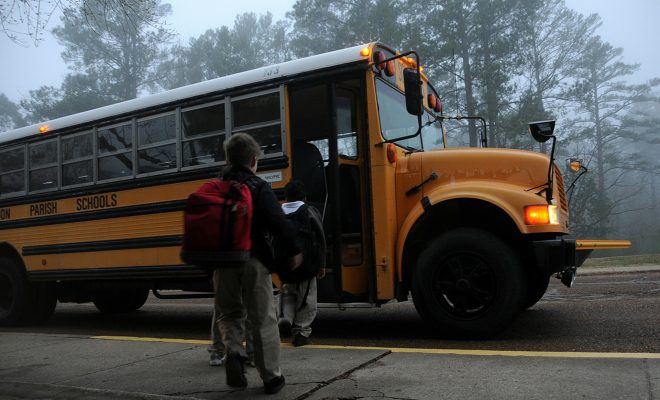Why teachers’ support is vital to blended learning success

A guest post by Don Brown
Blended learning provides today’s students with some control over their own learning paths. By combining elements of a traditional classroom with digital learning (and student input and customization of that learning), students have more opportunities for success.
Royd Darrington and Natalie Darrington are education leaders in Utah’s Juab School District and Royd is the principal of Juab High School which was recently admitted to the League of Innovative Schools, a network of superintendents and administrators solving the challenges of K-12 learning through research and technology.
This is a conversation with them regarding implementation of blended learning, and how relationships make the difference. Their responses are combined, so you will see points of view from an administrator and from a staff developer/teacher.
Q: How can a school leader get started in blended learning?
First, develop leadership capacity in the administrator ranks. This means Professional Development for the superintendent, central office staff and principals to understand a total vision. The vision is not about pieces of innovation, such as what device, or which LMS. We don’t want Administrators trying to create piece-meal solutions, we don’t want to get lost in the weeds. Helping create a clear 360 degree view of the purpose of blended learning as a tool for personalized learning allows administrators the ability to more effectively lead change in their own buildings..
That vision must be universally understood and communicated by building leader to teachers and the community. They will make it happen as long as they have a clear picture of the journey in mind and a set of clear goals and expectations to guide them.
In addition, Administrators must talk the talk before walking the walk.. Early on you need to help develop community buy in by helping ensure everyone knows what you are trying to accomplish, then you are ready.
The reality of getting teachers to understand is all about building the individual capacity of teachers. Start with something they are familiar with, ask to change the focus of professional practice to “why.” Why are you doing what you are doing? Start with the things they understand and keep the focus on content and learning. Everything else falls away. Teachers will quickly buy-in to personalized learning as a better way to meet the needs of all students, but they will struggle to visualize what it might look like in their own classroom. They want to be told how to do it before they understand why they are doing it. By beginning with the why first you allow teachers to develop the how based on their personal strengths rather than trying to duplicate a one-size fits all model.
Q: How can you create excitement with your teaching staff?
Consider the guiding forces for your professional development: what do we have, what to start with, what comes next. To begin there needs to be intrinsic motivation to help students. This is what’s best for students. Students being smart is not enough…it’s about growth and learning. This will encourage teachers to send a very different message to students. Rather than seeing compliance and other “recipe” skills as what constitutes a smart student…smart becomes more about the ability to learn independently, but under the guidance of the teacher.
If the student is the center, you can get teachers on-board.
Teachers need to feel they have support to try and to fail without fear of reprimand. If we are asking teachers to create personalized learning for students administrators must all personalized learning space for the teacher.. Giving teachers tools and the resources that allow them to see immediate results will be motivating.
For teachers who are not naturally in a growth mindset you must differentiate. In fact, the same principles we have for blended learning, individualization and competency-based learning apply to your professional development. Do not try to teach teachers who do not have growth mindset the same way as teachers who do. Teachers may push back with statements such as “Don’t tell me the philosophy, give me the list.” But, there is no list. But there are standards.
Just as student learning is closely tied to standards, the same is true for teachers. Focus on standards and competency is the starting place and those are natural levers for change. This should not appear to be massive change…simply a new focus that guides the teachers to understand. If you come across as implementing a big changes, teachers are more likely to say “I am already doing that” and shut down. Help them understand the story behind the change. Once teachers understand the role of competency based teaching and learning, they will understand the “how”. Expect grading to be a barrier for teachers, students and parents when shifting to competency-based models. Focus on the goal of having no failures, but allowing students the time they need, individually, to master the standards. Mastery is the constant; time, place, path and pace are now variables.
The bottom line for change is allowing teachers with choice and voice. They need to be empowered in the same way students are with competency-based models. Teacher job satisfaction is very high when they are supported to do the right things for the right reasons. If a teacher is stuck, ask: “Do you have a better idea?” Leave room for some failure along the way. That is part of learning.
Teachers will understand how to create instructional models that do not create barriers to learning. If any instructional practice creates a barrier for even one student to learn, we can’t have it.
Q: What does the future hold for education and blended learning?
Practice will drive policy, from the bottom up. In many states they have a top down reality. Legislators have been trying to force that conversation to change, but schools are digging in and fighting back. Online learning or virtual school is one end of the spectrum, pure traditional schooling at the other. The future is out in the middle with blended and enhanced virtual models as tools and strategies for providing fuller, more personalized learning experience for students.
The innovation in technology-supported learning has been driven by companies who targeted public school non-consumers, students who were not wanted by the public school, and students who rejected traditional education for one reason or another. At first, the goal was to appeal to the fringes, both high and low. Now we are starting to talk about using technology and blended models for all students in the traditional classroom setting.
Now we are at a point where we have educators who are openly accepting technology and the personalized learning movement, but policy based on traditional models restricts innovation. With pressure from politicians and now from a growing base of teachers and administrators, policies will exponentially evolve allowing freedom and flexibility for schools to offer personalized learning in traditional school with non-traditional methods. These innovating schools will show results, appeal to everyone in the political spectrum, because everyone gets what they want: more effective student learning and readiness for college and career. In addition, these innovating schools will have a voice in the public/political arena based on their success. Schools and Districts will not have a voice if they have traditional views and are reluctant to change.
Q: What can educators do to support this innovation?
We have to have an intelligent voice.
The faster we educational professionals can go from having virtual models at one end and traditional models at the other toward blended learning the better. As the conversation and practices move toward the middle ground of blended learning, the demand for policy and funding to change will increase. That groundswell will allow the policy be implemented with fidelity.
___
Don W. Brown, D.Ed. is the Client Services Manager, West Region for Odysseyware, Inc. He has been an elementary music teacher, principal in both virtual and bricks-and-mortar schools, and is an advocate for mass customization of learning.
Dr. Royd Darrington currently is the principal at Juab High School in Central Utah which was recently accepted as a member of the League of Innovative Schools. He serves as a consultant for many schools and school districts looking to improve student learning. He loves his job and truly believes education is the greatest tool we have to shape the future we desire.
Mrs. Natalie Darrington is currently working as an 8th grade math teacher and teacher mentor. She has been an educator for 14 years and has worked closely to support teacher growth for the past 9 years. She has been recognized numerous times in the classroom for her ability to help students learn at high levels, and is extremely adept at competency-based instruction.






